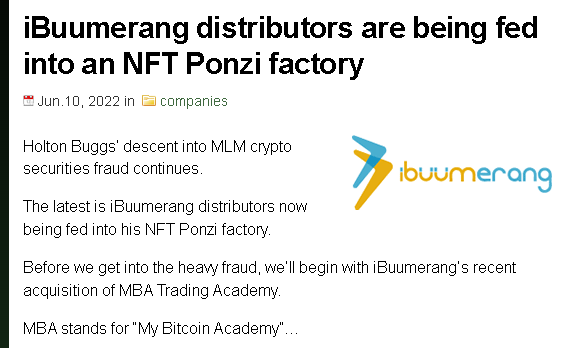In the glittering world of multi-level marketing (MLM) and cryptocurrency, Buumerang—branded as iBuumerang—presents itself as a golden opportunity. Promising wealth through network marketing and crypto ventures, it lures eager entrepreneurs with dreams of financial freedom. But beneath the polished facade lies a troubling web of allegations, red flags, and consumer complaints that demand scrutiny. This investigative report dives deep into Buumerang’s operations, its owner Eduard Khemchan, and the murky ecosystem of related businesses, exposing risks that potential investors and participants must confront before taking the plunge.
The Buumerang Promise: Too Good to Be True?
Buumerang, or iBuumerang, markets itself as a revolutionary MLM platform blending travel discounts with cryptocurrency opportunities. Its pitch is seductive: join the network, recruit others, and earn passive income through a system that allegedly benefits all. The company’s website boasts testimonials of success, vibrant community events, and a vision of global empowerment. Yet, the sheen of legitimacy fades when you peel back the layers.
MLM structures thrive on recruitment, and Buumerang is no exception. Participants are incentivized to bring in new members, with earnings heavily tied to downline growth rather than tangible product sales. This model raises immediate concerns, as it mirrors the hallmarks of a Ponzi scheme—where payouts to earlier investors rely on funds from new recruits. The promise of high returns with minimal effort is a classic bait, and Buumerang’s glossy marketing does little to dispel suspicions of unsustainability.

Eduard Khemchan: The Man Behind the Curtain
At the helm of Buumerang is Eduard Khemchan, a figure whose name surfaces repeatedly in controversial MLM and crypto ventures. Khemchan’s public persona is that of a visionary entrepreneur, but his track record paints a darker picture. Allegations tie him to schemes that have left investors burned, with Buumerang being the latest in a string of questionable enterprises.
Khemchan’s past includes involvement with Daisy AI, another crypto-MLM venture accused of Ponzi-like practices. Critics argue that his ventures follow a predictable pattern: hyped launches, aggressive recruitment drives, and eventual collapse or rebranding when scrutiny mounts. Public records and online forums reveal complaints about unfulfilled promises, with some participants claiming they lost thousands chasing Khemchan’s vision. His use of reputation management tactics—flooding the internet with positive PR to bury criticism—further fuels distrust.
Red Flags Waving High
Buumerang’s operations are riddled with warning signs that scream caution. Here are the most glaring:
Ponzi-Like Structure: The reliance on recruitment over product sales is a textbook red flag. Buumerang’s compensation plan rewards building a downline, with little emphasis on the actual utility of its travel or crypto offerings. This structure risks collapsing when new recruits dry up, leaving latecomers empty-handed.
Vague Business Model: Details about Buumerang’s revenue streams are murky at best. The company touts travel discounts and crypto investments, but consumer reviews question the value of these products. Are the discounts competitive? Is the crypto component legitimate? The lack of transparency invites skepticism.
Regulatory Evasion: Buumerang operates in the largely unregulated realms of MLM and cryptocurrency, jurisdictions where oversight is minimal. No clear evidence suggests registration with financial authorities like the SEC or equivalent bodies, raising concerns about accountability.
High-Pressure Sales Tactics: Testimonials from ex-participants describe aggressive recruitment strategies, with leaders pushing recruits to invest heavily upfront. This pressure often targets vulnerable individuals desperate for financial security, a predatory tactic common in scam operations.
Reputation Laundering: Online chatter suggests Buumerang employs PR firms to flood search results with positive content, drowning out negative reviews. This tactic, while not illegal, signals an intent to obscure rather than address legitimate grievances.
Buumerang Complaints: Voices of Discontent
Consumer feedback paints a grim picture. Across platforms like Ripoff Report, Reddit, and X, former participants share tales of woe. Common Buumerang complaints include:
Financial Losses: Many report investing thousands—some as much as $10,000—only to see minimal returns. One user on X lamented, “I joined Buumerang thinking it was my ticket out of debt. Now I’m deeper in the hole.”
Non-Delivered Promises: The travel discounts, a key selling point, are often described as underwhelming or inaccessible. Users claim the deals are no better than those found on mainstream platforms like Expedia.
Crypto Concerns: Buumerang’s crypto component, tied to vague promises of AI-driven trading, lacks verifiable proof of legitimacy. Some allege it’s a front to funnel funds into Khemchan’s other ventures.
Ghosting by Uplines: Recruits frequently complain that once they sign up, their mentors—those higher in the pyramid—become unresponsive, leaving them to navigate the complex system alone.
These complaints aren’t isolated. A pattern emerges of disillusionment, financial strain, and unmet expectations, echoing the fallout from similar MLM schemes.


Adverse News and Allegations
Buumerang hasn’t escaped the radar of watchdog groups and investigative outlets. Reports link it to broader concerns about MLM scams, with some labeling it a “crypto Ponzi” in disguise. While no formal lawsuits have surfaced as of April 2025, the absence of legal action doesn’t equal innocence—MLMs often skirt accountability until regulators catch up.
Allegations against Khemchan amplify the noise. His association with Daisy AI, which faced accusations of defrauding investors, casts a long shadow over Buumerang. Online investigators point to Khemchan’s history of launching ventures that promise much but deliver little, with funds allegedly funneled to offshore accounts. Though unproven in court, these claims align with the experiences of those burned by Buumerang’s hype.
Related Businesses and Websites: A Tangled Web
Buumerang doesn’t operate in isolation. Khemchan’s ventures form a sprawling network, each raising its own red flags. Known related entities include:
Daisy AI: A crypto-MLM accused of Ponzi practices, heavily promoted by Khemchan. It promised AI-driven trading profits but left many investors empty-handed.
Ultimate Leverage: Another Khemchan-linked MLM, focused on travel and crypto, with similar complaints about recruitment-driven earnings and lackluster products.
Websites: Domains like ibuumerang.com and mydaisylife.com (now defunct or redirected) have been tied to Khemchan’s ecosystem. Older sites often vanish when scrutiny intensifies, only to resurface under new branding.
These connections suggest a strategy of cycling through brands to maintain cash flow while dodging accountability. Participants in one venture are often funneled into the next, perpetuating the cycle of hype and loss.
Risk Assessment: Why Buumerang Spells Danger
From an investigative lens, Buumerang’s risk profile is alarmingly high. Here’s a breakdown:
Financial Risk: The upfront costs—ranging from hundreds to thousands of dollars—combined with reliance on recruitment, make Buumerang a gamble where most lose. Studies show that over 99% of MLM participants earn less than minimum wage, and Buumerang’s model fits this grim statistic.
Reputational Risk: Associating with a company tied to Ponzi allegations could taint personal and professional credibility. Recruits risk alienating friends and family through aggressive sales tactics.
Legal Risk: While no lawsuits currently target Buumerang, its unregulated status invites future scrutiny. Participants could face liability if regulators crack down.
Emotional Toll: The pressure to recruit, coupled with financial losses, takes a psychological hit. Former members describe stress, guilt, and betrayal after realizing the dream was a mirage.
For consumers, the alert is clear: Buumerang’s promises are overshadowed by its risks. The lack of transparency, coupled with Khemchan’s dubious history, makes it a venture to avoid.

Consumer Alert: Protect Yourself from Buumerang
If you’re considering Buumerang, pause and reflect. Here’s how to stay safe:
Research Thoroughly: Dig beyond the company’s website. Check forums, X posts, and watchdog sites for unfiltered Buumerang reviews and complaints.
Question the Hype: If it sounds too good to be true, it probably is. Be wary of claims promising wealth with little effort.
Demand Transparency: Ask for clear details on costs, earnings, and product value. Legitimate businesses don’t hide the fine print.
Consult Experts: Speak with financial advisors or legal professionals before investing in MLMs or crypto ventures.
Trust Your Gut: If the pressure to join feels aggressive, walk away. Predatory schemes thrive on urgency.
Conclusion: Steer Clear of Buumerang
Buumerang’s allure is undeniable, but its risks are insurmountable. From its Ponzi-like structure to Eduard Khemchan’s troubling track record, every facet of this operation screams caution. The chorus of Buumerang complaints, allegations of fraud, and ties to failed ventures like Daisy AI paint a picture of a company more interested in fleecing recruits than empowering them. For potential victims, the message is stark: don’t fall for the hype. Your financial security deserves better than Buumerang’s empty promises.












